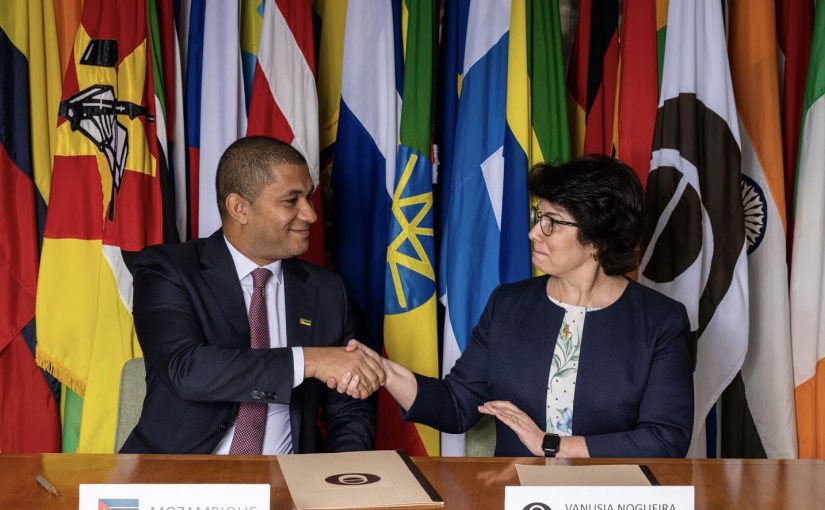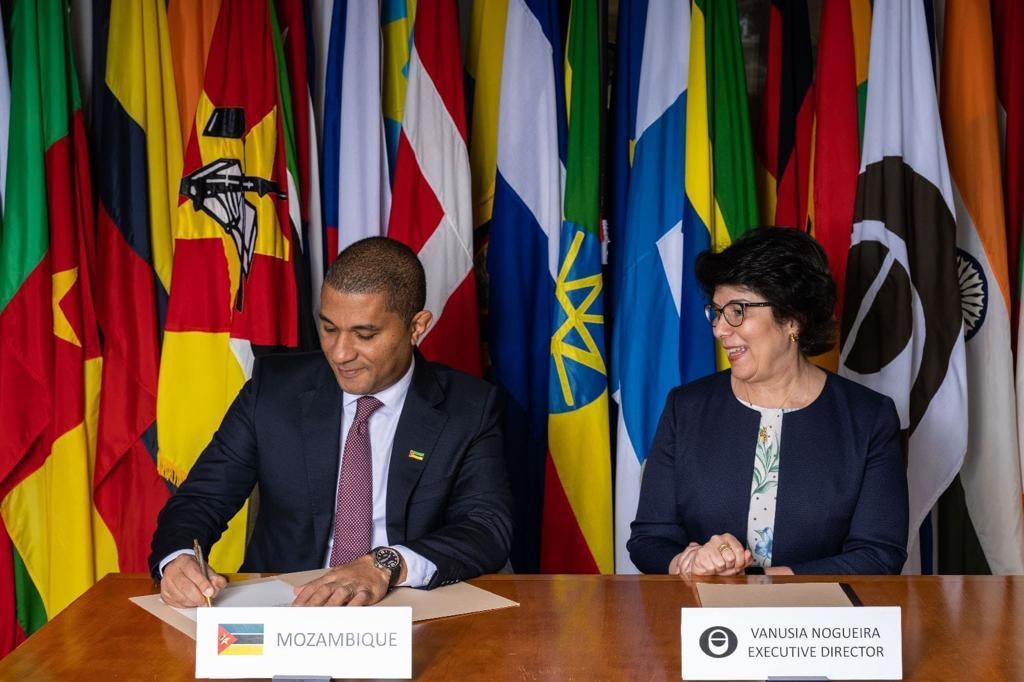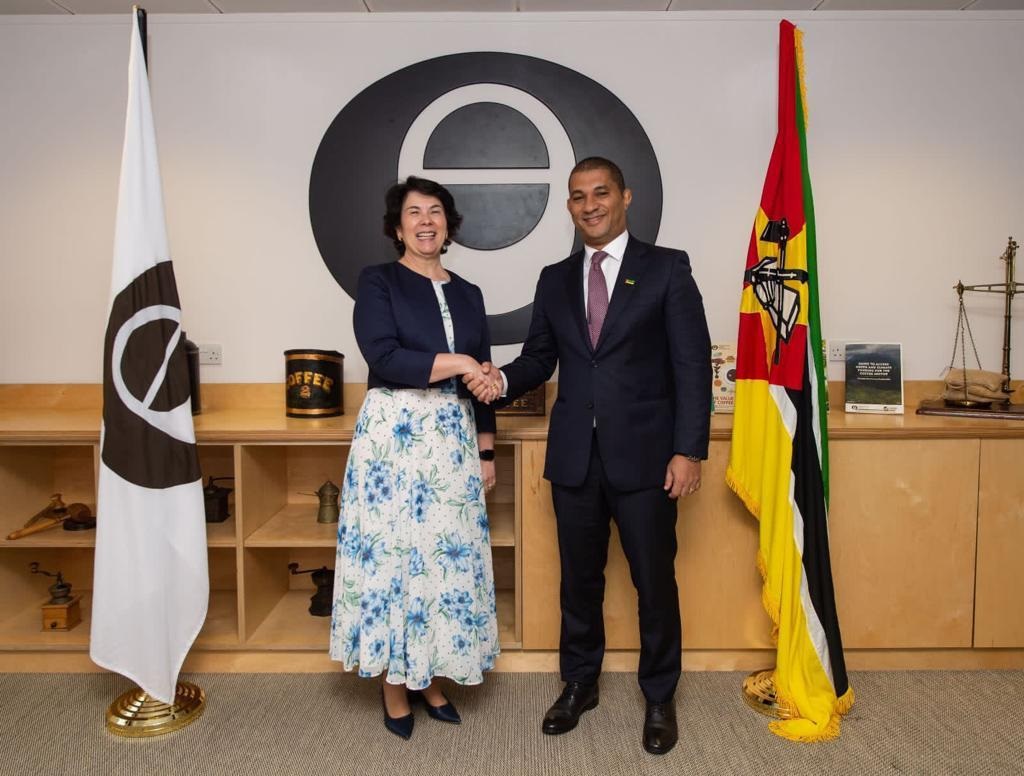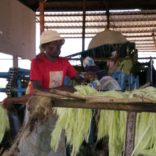Cabo Delgado accounts for 20% of Mozambique's timber harvesting quota in 2025
Mozambique joins the International Coffee Organisation

Mozambique, which produces some of the world’s most environmental and socially sustainable coffee, yesterday signed the International Coffee Agreement (ICA) 2022 as it joined the ICO at a ceremony in central London [Photo: @ICOCoffeeOrg]
Mozambique, which produces some of the world’s most environmental and socially sustainable coffee, yesterday signed the International Coffee Agreement (ICA) 2022 as it joined the International Coffee Organisation (ICO) at a ceremony in central London.
Mozambique joined for the 1st time in its history #ICO! Min. of Agriculture & Rural Dev.t, Celso Correia signed the new International Coffee Agreement #ICA2022 in the presence of ICO ED @VanusiaNogueira & representatives of the coffee sector with @AmoCafe👉https://t.co/S3pwIvHCMI pic.twitter.com/42aslQWJo5
— International Coffee Organization (ICO) (@ICOCoffeeOrg) June 13, 2023
- The Government of Mozambique yesterday joined for the first time in its history the International Coffee Organization (ICO), signing the new ICA 2022, at the ICO headquarters in London.
- Mozambican coffee is celebrated as one of the world’s most environmentally and socially sustainable, with the crop cultivated and picked by local farmers.
- In Gorongosa National Park the establishment of new coffee plantations, which thrive in the shade of indigenous trees, has enabled the revitalization of the local rainforest.
- The Agreement was signed by Mozambique’s Minister of Agriculture and Rural Development, Celso Correia, and was followed by a gala reception in central London.
The Government of Mozambique on Monday joined the International Coffee Organization (ICO) for the first time in its history, at a ceremony held in central London. The southern African state is committed to offering coffee lovers around the world environmentally friendly and socially sustainable coffee.

The ceremony was attended by the country’s Minister of Agriculture and Rural Development, Celso Correia, as well as representatives from the country’s growing coffee sector, overseen by Amocafé, in the presence of the ICO’s Executive Director, Vanúsia Nogueira.
Mozambican coffee is celebrated for its commitment to habitat restoration and biodiversity preservation. It also relies on partnerships with rural communities, enabling local farmers to benefit from training and access to resources and markets. The country’s coffee industry is dedicated to long-term sustainability through initiatives such as organic farming, agroforestry and resource diversification within Protected Areas.
In Gorongosa, where the National Park was ravaged by civil war and lost almost all its wildlife, the introduction of green beans originating in Mozambique has provided a long-term incentive for local communities to protect a rainforest that was previously disappearing at a rate of over 100 hectares a year, as the crop is grown in the shade of native trees. 100 per cent of the profits from green bean cultivation are returned to the local community.
Similarly, on the misty highlands of the Chimanimani mountains, organic coffee is produced as part of an agroforestry system, which includes reforestation of degraded and deforested areas of the reserve to safeguard the soil, flora and fauna.
These practices aim to preserve the country’s rich biodiversity while actively involving local communities.
By joining the ICO, Mozambique hopes to contribute to the development of global policies on coffee sustainability and participate in in the exchange of knowledge with other coffee-producing nations.
The country’s oldest coffee is Café de Ibo, which has been grown on Ibo and Quirimba islands since it was first introduced by the Arab traders in the 11th Century and is to this day largely grown in the traditional manner. Ibo coffee is a rare naturally low caffeine coffee and has long been a favourite of those who knew of it, including the judges at the Gold Medal Award in Lisbon in 1906 when it won.

Celso Correia, Mozambique’s Minister of Agriculture and Rural Development, said:
“This is a historic day for Mozambique as we join the International Coffee Organization. Our coffee sector is growing fast and is an important part of our plans for the future and the change we wish to bring to our country. It is also one at the heart of our plans for sustainability. Coffee is being grown in areas that include some of the most biodiverse in the world and we are committed to ensuring that the crop’s growth supports the protection of the natural environment. The Government is working closely with rural farmers to support them in the industry, and we have created systems that ensure the vast majority of profits go back to those who grow the crop. Mozambique wants people to experience how every sip of its coffee tells a story – one of heritage, passion and the richness of its land. By choosing Mozambican coffee, consumers will not only enjoy a unique taste experience, but also support local farmers and their sustainable practices, and help preserve the biodiversity of the country’s landscapes. Mozambique is proud to now be part of the world’s coffee producing nations. We look forward to more and more people being able to enjoy Mozambique’s coffee in the years and decades to come.”
Vanúsia Nogueira, ICO Executive Director, said:
“Today we celebrate a historic day for the ICO with the entry of a new member, Mozambique, also a signatory to the new ICA 2022. It is important for us to emphasize that our engagement with Mozambique, as with all our Members, is not solely defined by the challenges facing the global coffee community, but first and foremost by the opportunities that lie ahead. Together, we will advance shared priorities that have the potential to diversify economies, build resilience and, ultimately, deliver concrete results for people. I am convinced that Mozambique’s contribution, as a full partner of the ICO and the new ICA, will be crucial in shaping the coffee industry for a bright, sustainable future. Sustainability is not a goal, but a path that we must constantly create with our Members and partners to continuously improve the coffee sector: Welcome, Mozambique, to the world coffee family, as the 27th African country to become a Member of the ICO.”
The six Mozambique coffee brands now to be exported internationally are:
- Nossa Gorongosa, which is grown in the National Park by Gorongosa Mountain;
- Café Chimanimani, which is coffee with a full-bodied experience and velvety texture;
- Café Niassa, which prioritises organic practices and works closely with local farmers;
- Café Vumba, which has adopted woman-focused organic farming practices;
- Café de Manica, which is cultivated in the picturesque Mussapa mountains;
- Café de Ibo, which is the country’s oldest coffee grown on the sandy shores of the Indian Ocean.
The signing ceremony was followed by a celebratory coffee morning at London’s Groucho Club in Soho that was attended by a diverse group of Mozambique coffee lovers including roasting companies and representatives of international organizations as well as celebrities and artists. Among those in attendance were American philanthropist Greg Carr, celebrated artist Gavin Turk, chef Mark Hix, three times winner of Barista of the Year Maxwell Colonna-Dashwood, business leader Tami Longaberger and Koffee UK founder Marco Arigo.
Mozambique joined for the 1st time in its history #ICO! Min. of Agriculture & Rural Dev.t, Celso Correia signed the new International Coffee Agreement #ICA2022 in the presence of ICO ED @VanusiaNogueira & representatives of the coffee sector with @AmoCafe👉https://t.co/S3pwIvHCMIpic.twitter.com/42aslQWJo5
— International Coffee Organization (ICO) (@ICOCoffeeOrg) June 13, 2023
Champion barristas serving
Mozambican coffee today in Soho, great to see new 🇬🇧🇲🇿 export agreements signed supporting small holder farmers, gender & climate smart coffee farming in some of the most beautiful areas of Mozambique #girlsruntheworld #gofargotogether @GorongosaPark pic.twitter.com/oyPd0tGaQw— Helen Lewis (@HelenLewis_UK) June 13, 2023
About the ICO
The International Coffee Organization (ICO) was established in 1963 under the aegis of the United Nations and following the approval of the first International Coffee Agreement in 1962. The ICO is the only intergovernmental organization for coffee, bringing together exporting and importing Governments. It currently represents 93% of world coffee production and 63% of world consumption.
Mission of the ICO
The mission of the Organization is to strengthen the global coffee sector and promote its sustainable expansion in a market-based environment for the benefit of all actors in the Global Coffee Value Chain (G-CVC).
Scope of work of the ICO
The ICO provides a unique forum for dialogue among governments, the private sector, development partners, civil society and all coffee stakeholders to tackle the challenges facing the sector through international cooperation and to nurture opportunities. The Organization collects and compiles independent official statistics on coffee production, trade and consumption; supports the development and funding of technical cooperation projects and public-private partnerships; and promotes sustainability and coffee consumption. It facilitates the coffee sector’s contribution to the achievement of the United Nations Sustainable Development Goals (SDGs) to increase the resilience of local communities and coffee farmers, in particular smallholders, and enable them to benefit from coffee production and trade, which can in turn contribute to poverty eradication by providing a living income for families.
Focus areas
The ICO operates under a Five-Year Action Plan and annual Programme of Activities which are approved by ICO Members through the decision of the International Coffee Council.
The current Five-year Action Plan aims at making a practical contribution to the development of a sustainable, inclusive and resilient global coffee sector and to the reduction of poverty in developing countries. It identifies three priority areas, namely:
1. Delivering world-class data, analysis and information to the industry and policy-makers;
2. Using the Organization’s convening power to provide a forum for dialogue between and within the public and private sectors;
3. Facilitating the development of projects and promotion programmes through public-private partnerships.












Leave a Reply
Be the First to Comment!
You must be logged in to post a comment.
You must be logged in to post a comment.